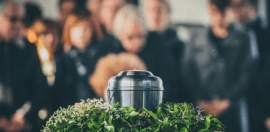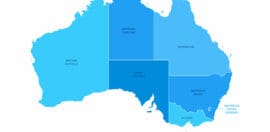Rocking the cradle

6 February 2020 at 8:48 am
Business as usual is no longer going to be enough for governments, neither will it be for charities. If we hope to grow in strength and effectiveness we will need to support collective action for change, writes Community Council for Australia CEO David Crosbie.
We won’t know ’til it’s gone
All the glory we’ve got
But there are more wonders coming
All new kinds of shows
With acid seas rising
To kiss coastal mountains
And big cyclones pounding
And firestones devouring
And we’ll lose track of counting
As the corpses keep mounting
But hey, that’s just the way this old world goes
Sleep, my country, sleep
As we sow so shall we reap
Who’ll rock the cradle and cry?
– Extract from the lyrics of Paul Kelly’s new lullaby for Australia – Sleep, Australia, Sleep.
There is a strange feeling in Canberra. The sunsets glow crimson and most nights the smoke haze turns the moon orange. We stay indoors with windows and doors shut because of poor air quality. These are very small inconveniences in the face of the devastation many families are experiencing, the consequence of our horrific fires combined with ongoing drought, but they matter.
Whenever I talk to the people in my community about how things are, there is a sense of loss that goes beyond the tragedy of more than 30 deaths, billions of hectares and animals all gone. There is a quiet resignation, a loss of spirit, of optimism for the future.
One of the factors that compounds our concerns is the short-term tribalism and lack of vision from our leaders.
As a country we seem to be stuck in a time-warped mindset where the economic drivers of our nation are still about digging things up and selling them, still seeking the equivalent of episodic gold rush booms that enabled our sandstone histories, still relying on rising iron ore prices to prop up our shallow budget surplus. It is clear this one dimensional way of thinking will not serve us well into the future, but still it dominates our politics, our media, our discourse.
Alongside our historical approach to governing our country sits what is becoming another outdated way of thinking, the community expectation that government can and should fix things.
Whenever there is a problem in Australia, people generally expect the government to provide an answer. Often they cannot. Many people are only now realising that governments tend to be self serving, looking after the people and interests that look after them.
The real business of government has become to stay in government, even if that means acting without integrity, acting as if the ends justifies the means. The notion that the government is there to serve the people has been significantly dented by multiple failures, hail storms of self-serving denials (“we did everything right / nothing wrong”), diminishing credibility and trust to a point where many people just do not know what to believe anymore.
In these unprecedented times, it has never been more important for us to celebrate that so many Australians have the opportunity to be part of a charity, part of making a difference, part of the solutions.
I often visit and talk with charities that are driven by grounded practical thinking, innovation and creativity in addressing their issues, responsiveness and adaptability. These are the strengths that will not only build our sector, but also change Australia for the better.
But just as business as usual is not going to be enough for governments, neither will it be for charities. Times will get tough and if we hope to grow in strength and effectiveness we will need to support collective action for change.
Many charities engage in their own form of collective action, bringing together people who are experiencing hardships, providing safe places, offering support and belonging, building trust within communities, especially those communities feeling lost or let down. I can only encourage and applaud our sector in the way it has been doing this especially over the past few months. The more we talk about these efforts and how they are harvesting hope, the stronger our communities will be.
We can build on these charity based networks recognising that many small groups aligned to a common purpose can be more effective than a big centralised campaign.
We also need to engage in a collective way as a sector. This is something we have not done very well in the past. Charities generally tend to quietly go about their purpose.
This year we already know of two really significant dates for collective action that more of us need to plan around and become involved in.
The first is International Day of Charity – on the 5 September 2020, the United Nations invites all member states, international and regional organisations, non-governmental organisations and individuals alike to commemorate the International Day of Charity by encouraging charitable acts in their respective communities to raise public awareness of this event.
Imagine if Australia had 500,000 acts of charity on that day? How good would it feel being part of something global to celebrate doing good in our communities? What might we all be able to contribute on that day? How might we validate our communities, our staff, our supporters?
Giving Tuesday is on the 1 December. This is still 10 months away, but this year it would be great if thousands of charities could run open days and other events to encourage more giving and engagement with charities across all our communities.
I know that throughout 2020 there will be times when CCA and other groups will highlight issues charities can become involved in as part of their own change agenda.
Charities may not be able to immediately clear the air, lift the gloom, recreate lost environments, make governments suddenly become accountable and responsive, but we can help build the kind of forward-looking Australia we want to live in. We cannot let Australia sleep walk into a disastrous future.
When Paul Kelly asks who will rock the cradle, I think charities already have the answer.
About the author: David Crosbie is CEO of the Community Council for Australia. He has spent more than 20 years as CEO of significant charities including five years in his current role, four years as CEO of the Mental Health Council of Australia, seven years as CEO of the Alcohol and other Drugs Council of Australia, and seven years as CEO of Odyssey House Victoria.
David Crosbie writes exclusively for Pro Bono News on a fortnightly basis, covering issues of importance to the broader not-for-profit sector.







